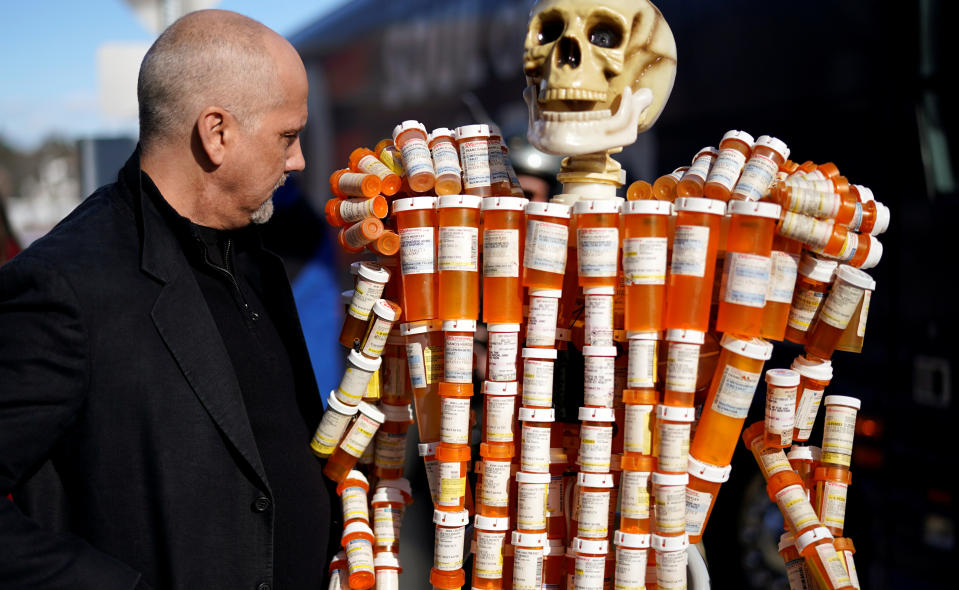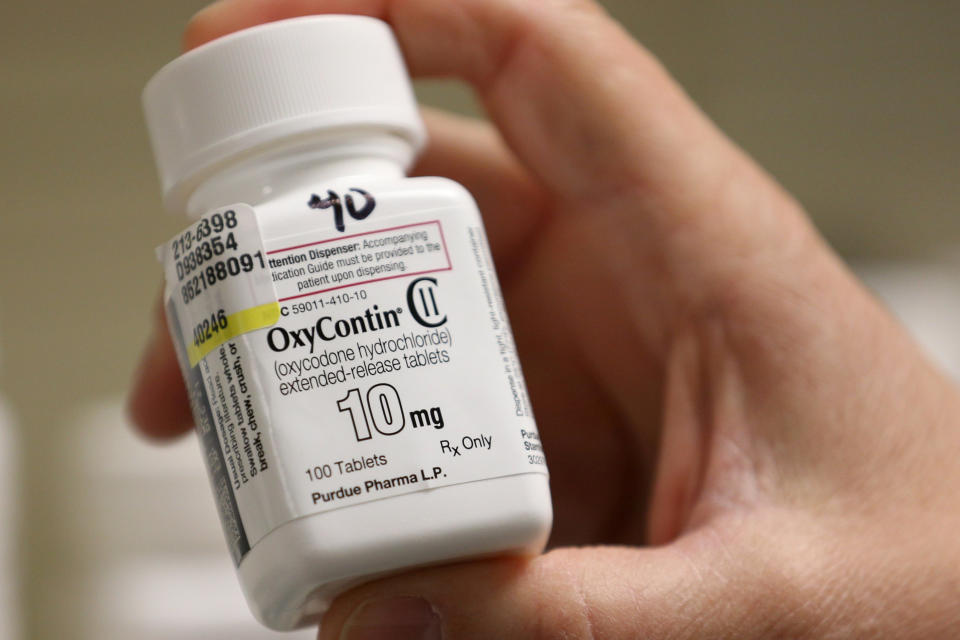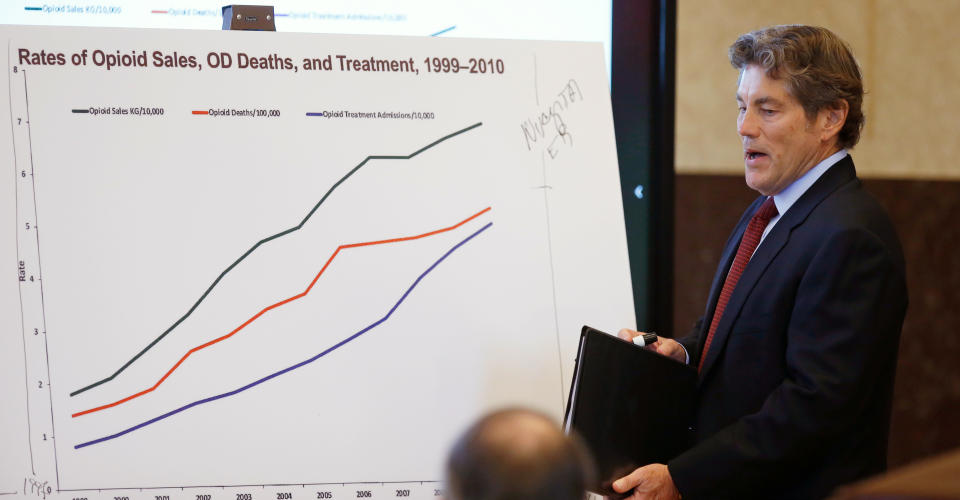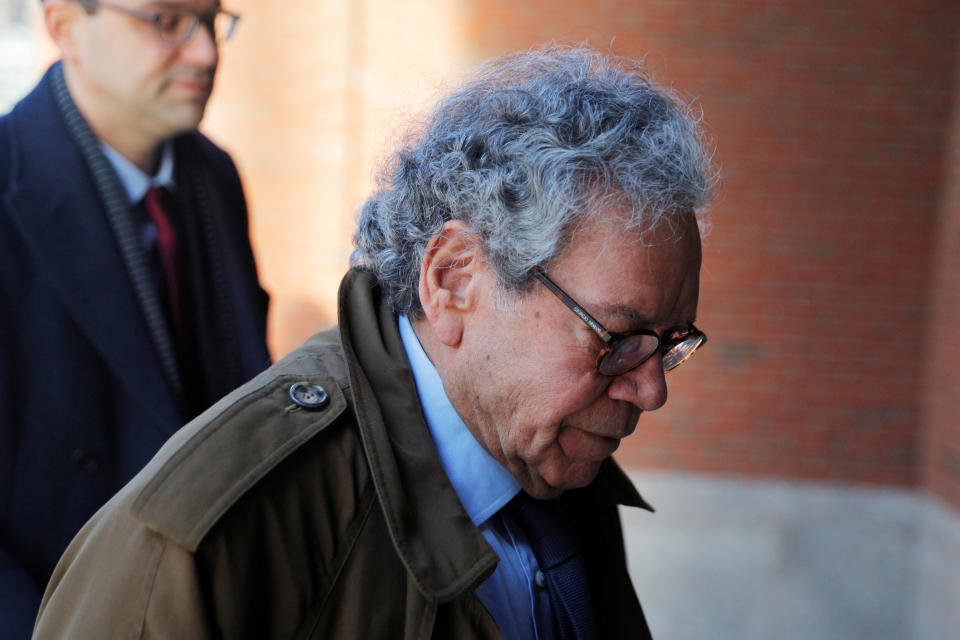Coalition to Bill Barr: Imprison pharma executives for their roles in opioid crisis
A letter addressed to Attorney General Bill Barr and the U.S. Department of Justice (DoJ) is calling out major pharmaceutical companies for their role in the U.S. opioid crisis.
The FED UP! Coalition, an organization made up of thousands of individuals who have been affected by addiction, penned an open letter signed by over 60 different organizations, asking the DoJ to take action and hold the executives in these companies responsible.
“One major problem is that the complicit Big Pharma opioid executives are themselves not being held accountable for their illegal business practices,” Emily Walden, chair of the FED UP! Coalition, told Yahoo Finance. “There must be consequences for their unlawful actions, and we need the United States Department of Justice to lead those efforts.”

And while many of these companies have begun opioid education programs, Walden said it’s not enough.
“People are still dying daily from opioid overdoses and individuals of all ages and socioeconomic backgrounds are still becoming addicted to pain pills, even after all these years engaging the public about the dangers of opioids,” she said.
‘It is not too late to act’
The letter implied that the opioid crisis would have been less severe had industry executives been prosecuted for their actions rather than their companies.
“But it is not too late to act,” the letter said. “On behalf of the millions of victims of the opioid industry, we urge the Department of Justice to hold these individuals accountable to the fullest extent of the law.”
The letter singled out opioid makers and distributors, including Johnson & Johnson (JNJ), AmerisourceBergen (ABC), McKesson Corporation (MCK), Cardinal Health (CAH), Endo Pharmaceuticals (ENDP), Mallinckrodt (MNK), Teva Pharmaceuticals (TEVA), and Purdue Pharma, accusing them of breaking the law “in their pursuit of profit.”

“We are dedicated to doing our part as a distributor to mitigate the diversion of these drugs without interfering with clinical decisions made by doctors, who interact directly with patients and decide what treatments are most appropriate for their care,” AmerisourceBergen said in a statement to Yahoo Finance.
“Beyond our reporting and immediate halting of potentially suspicious orders, we refuse service to customers we deem as a diversion risk and provide daily reports to the DEA that detail the quantity, type, and the receiving pharmacy of every single order of these products that we distribute. We are committed to collaborating with all stakeholders on ways to combat opioid abuse.”
All other companies either declined to comment or did not respond to requests for comment.
So far, all of these companies have faced some kind of lawsuit related to their roles in the U.S. opioid crisis. For example, Cardinal and McKesson were sued by Montana’s attorney general earlier this year and Oklahoma’s attorney general, who included AmerisourceBergen in his suit.
The letter stated that one lesson that’s come from the opioid crisis is that fines and settlements from manufacturers and distributors are “not an adequate deterrence.”
“It is clear from their actions that the individuals controlling these companies see fines and settlements as the cost of doing business,” the letter said.

Last year, a judge ruled that Johnson & Johnson had to pay Oklahoma $572 million because of the company’s “false, misleading, and dangerous marketing campaigns.” (A revision to the ruling cut off $107 million from the payment.)
While the Johnson & Johnson case was considered a landmark ruling, it was the company that was held responsible and no one individual.
FED Up!’s letter cited similar instances of this happening — AmerisourceBergen, Cardinal Health, and McKesson were fined by the DoJ for improperly distributing opioids in 2007 and 2008.
“If senior executives had been held individually accountable for their illegal and reckless behavior, their companies would likely have changed their ways,” the letter stated. “Instead, they would continue to break the law year after year, continue to pay fines, and continue to flood states and counties with hundreds of millions of opioid pills.”
![(L-R)Ilene Shapiro executive director of Summit County, Michael OMalley Cuyahoga county prosecutor, and Armond Budish, Cuyahoga County Executive brief the press after an opioid trial in Cleveland, Ohio on October 21, 2019. - Three leading drug distributors and an Israeli drugmaker blamed for a deadly US opioid epidemic settled with plaintiffs Monday just hours before they were to go on trial, a federal judge announced. The deal is worth $260 million to two Ohio counties at the center of the lawsuit but could spell billions more for 2,700 US communities devastated by addiction and overdose epidemic.The settlement involved the three leading US drug distributors -- Cardinal Health, Amerisource Bergen, and McKesson Corp and Israel's generic drug manufacturer Teva.Pharmacy chain Walgreens will continue to go to trial at a later date, said Federal District Judge Dan Polster. (Photo by Megan JELINGER / AFP) / The erroneous mention[s] appearing in the metadata of this photo by Megan JELINGER has been modified in AFP systems in the following manner: [Armond Budish, Cuyahoga County Executive] instead of [Mark Lanier the lawyer representing Cuyahoga and Summit counties]. Please immediately remove the erroneous mention[s] from all your online services and delete it (them) from your servers. If you have been authorized by AFP to distribute it (them) to third parties, please ensure that the same actions are carried out by them. Failure to promptly comply with these instructions will entail liability on your part for any continued or post notification usage. Therefore we thank you very much for all your attention and prompt action. We are sorry for the inconvenience this notification may cause and remain at your disposal for any further information you may require. (Photo by MEGAN JELINGER/AFP via Getty Images)](https://s.yimg.com/ny/api/res/1.2/bn1H6QwsE8qqgqlrNHc.kw--/YXBwaWQ9aGlnaGxhbmRlcjt3PTk2MDtoPTY0MA--/https://media-mbst-pub-ue1.s3.amazonaws.com/creatr-uploaded-images/2020-08/7a1f1310-ebbb-11ea-a7b4-d2fd49fcf1de)
And in 2008, Teva was forced to pay $425 million in criminal and civil penalties for “off-label marketing” of its fentanyl lollipop.
“Had the bad actors been prosecuted, Teva would likely not have repeated the exact same criminal behavior with its off-label marketing of a fentanyl lozenge and Insys would likely have been deterred from bribing doctors to prescribe its fentanyl spray off-label,” the letter said.
‘We want criminal charges filed’
The FED UP! Coalition doesn’t just want these executives to be individually fined — they want prison time for causing what they describe as “this man-made plague.”
“It is important to recognize that the actions described above led to millions of cases of opioid addiction and more than 500,000 deaths since 1999,” the letter said. “While families emptied their bank accounts seeking treatment for their loved ones, executives responsible for the opioid crisis have acted with impunity and accrued immense wealth.”

It’s relatively uncommon for pharmaceutical executives to be sent to prison. The most notable case happened back in January 2020, when John Kapoor, founder of Insys, and six of his colleagues were found guilty of racketeering conspiracy related to bribing doctors to prescribe a fentanyl spray manufactured by Insys.
“We cannot let opioid-related companies and their executives operating illegally just walk away with paying a fine,” Walden said. “These executives must fear doing prison time before there will be significant changes. We want criminal charges filed against the executives of the pharmaceutical companies who broke the law in pursuit of profits that caused harm to millions of Americans.”
This post has been updated to include comment from AmerisourceBergen.
Adriana is a reporter and editor for Yahoo Finance who covers politics and health care policy. Follow her on Twitter @adrianambells.
READ MORE:
Coronavirus pandemic 'threatens to make the opioid crisis substantially worse'
Expert: America's 'legacy of racism' led to a broken drug treatment system
The opioid crisis is 'a unique product' of U.S. health care, paper argues
Read the latest financial and business news from Yahoo Finance
Follow Yahoo Finance on Twitter, Facebook, Instagram, Flipboard, SmartNews, LinkedIn, YouTube, and reddit.

 Yahoo News
Yahoo News 

